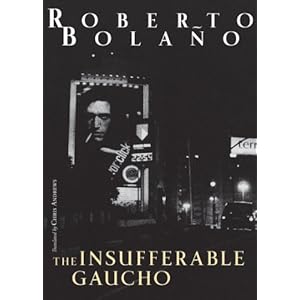New Bolaño Translations
August 7, 2010

The Return is a collection of stories omitted from Bolaño’s Last Evenings on Earth. It was published by New Directions on July 29th and translated by Chris Andrews (who translated just about all of Bolaño’s works except 2666 and The Savage Detectives).
I’ve yet to read it, but it seems to be getting good reviews. Here’s one from the LA Times:
http://articles.latimes.com/2010/jul/25/entertainment/la-ca-roberto-bolano-20100725
—-

The Insufferable Gaucho (also translated by Chris Andrews) will be released on August 31st. It’s a collection of 7 stories and an essay called “Literature + Illness = Illness”, a candid piece in which Bolaño confronts the sickness that would eventually kill him. You can read the first part of this essay here.
Also, you can read the entirety of the title story at the New Yorker’s Website here.
“I wrote this book for myself, but even that I can’t be sure of. For a long time these were just loose pages that I reread and maybe tinkered with, convinced I had no time. But time for what? I couldn’t say exactly. I wrote this book for the ghosts, who, because they’re outside of time, are the only ones with time. After the last rereading (just now), I realize that time isn’t the only thing that matters, time isn’t the only source of terror. Pleasure can be terrifying too, and so can courage…”
-Bolaño, in his introduction to Antwerp.
Bolaño Documentary
August 4, 2010
Here’s a great hour-long documentary on Bolaño. It contains a brief biography and centers mostly on his last years living in Spain. Very interesting.
– in Spanish, no subtitles
http://www.rtve.es/mediateca/videos/20100724/imprescindibles-24-07-2010-roberto-bolano/837975.shtml
El aplauso/Applause
May 21, 2010
El aplauso/Applause
She said she loved busy days. I looked at the sky. “Busy days”, as well as clouds and cats that slipped away between the bushes. Those flowers that I left in the field are my proof of love for you. Later I came back with a net to look for butterflies. The girl said: “disaster”, “horses”, “rockets” and patted me on the back. Her back spoke. Like crickets squealing in the afternoons of lonely villas. I closed my eyes, breaks squealed and the police quickly got out of their cars. “Don’t stop looking out the window.” Without speaking two of them reached the door and said “police”, the rest I could hardly hear. I closed my eyes, the boys died on the beach. Bodies full of holes. There’s something obscene in all of this, said the nurse when no one was listening. “Busy days, I looked at the sky, cats”, surely I won’t return to the open air, not with flowers, not with a net, nor with a damned book to pass the afternoon. The mouth opened but the author couldn’t hear anything. He thought in silence and later thought “it doesn’t exist”, “horses”, “a waning moon in August”. Cast in black. Someone applauded from the void. I suppose this is happiness.
(Translated by Tim Pilcher)
La totalidad del viento/All the wind
May 19, 2010
La totalidad del viento/All the wind
Twin highways suspended over dusk when all seems to indicate that memory ambitions delicacy are kaput, like the rental car of a tourist who penetrates into war zones without knowing and never returns, at least not in a car, a man that runs across highways suspended over a zone that his mind refuses to accept as a barrier, vanishing point (the transparent dragon), and the news says that Sophie Podolski[1] is kaput in Belgium, the girl from the Montfauçon Research Center, and lips say “I see seasonal waiters walking along the deserted beach at eight o’clock at night, slow gestures, a group swept away by the wind charged with sand”… “For a moment, a rather fat 11 year old girl lit up the public pool”… “and Colan Yar is after you too?”… “a black meadow embedded in the highway?”… A man is sitting on one of the balconies in the ghetto. He writes postcards since his breathing prevents him from writing poems as he’d like. What I mean is: free poems, without any added value. His eyes retain a vision of nude bodies coming slowly out of the sea. Later only the void remains. “Seasonal waiters walking along the beach”… “The light of dusk clouding our perception of the wind”… “All the wind”.
(Translated by Tim Pilcher)
[1] Sophie Podolski (1953 – 1974) was a Belgian poet and graphic artist. She published only one book during her short lifetime, Le pays où tout est permis (The Country Where Everything Is Permitted), in which the poems were reproduced in her own artistic handwriting.
First Infrarealist Manifesto
May 12, 2010
Here is the second draft of my translation of the First Infrarealist Manifesto into English. While in no way official, it’s a starting point in understanding the movement for non-Spanish speakers. Bolaño’s style here is highly lyrical and very much in the tradition of avant-garde manifestos (ie the Futurist or Surrealist manifestos). Poetry, sense, and momentum are emphasized over logic and clarity. For this reason, some of the sentences may feel odd or out of place when translated. I encourage you to look at the original version in Spanish (which can be found on the “Infrarealism” page) if you have any doubts.
Feel free to distribute/link to/copy/use this translation of the Infrarealist Manifesto in any way you wish.
——–
GIVE IT ALL UP AGAIN
first infrarealist manifesto